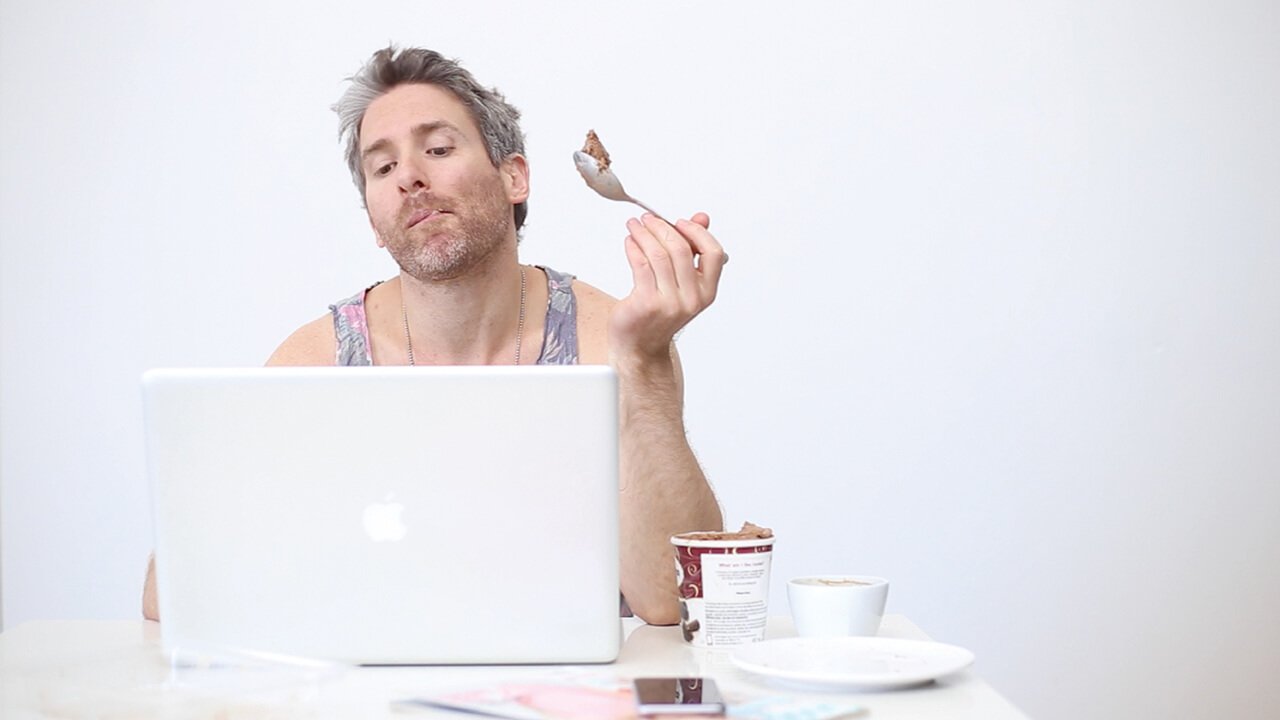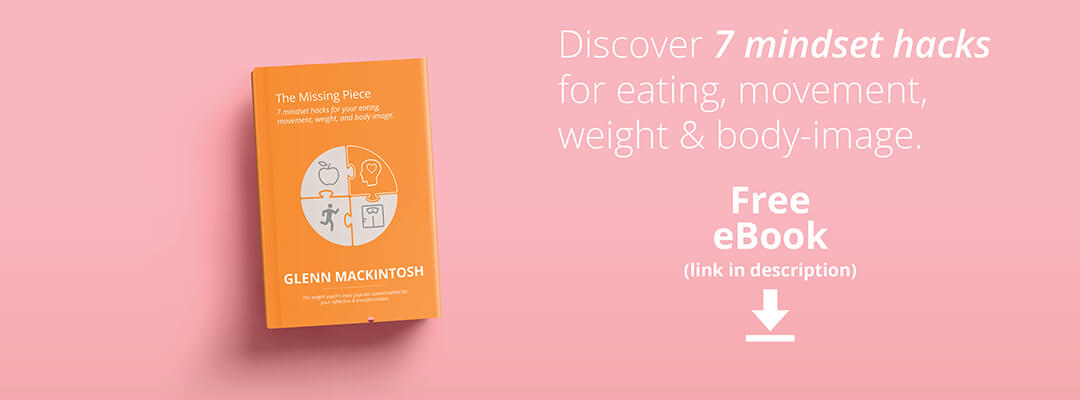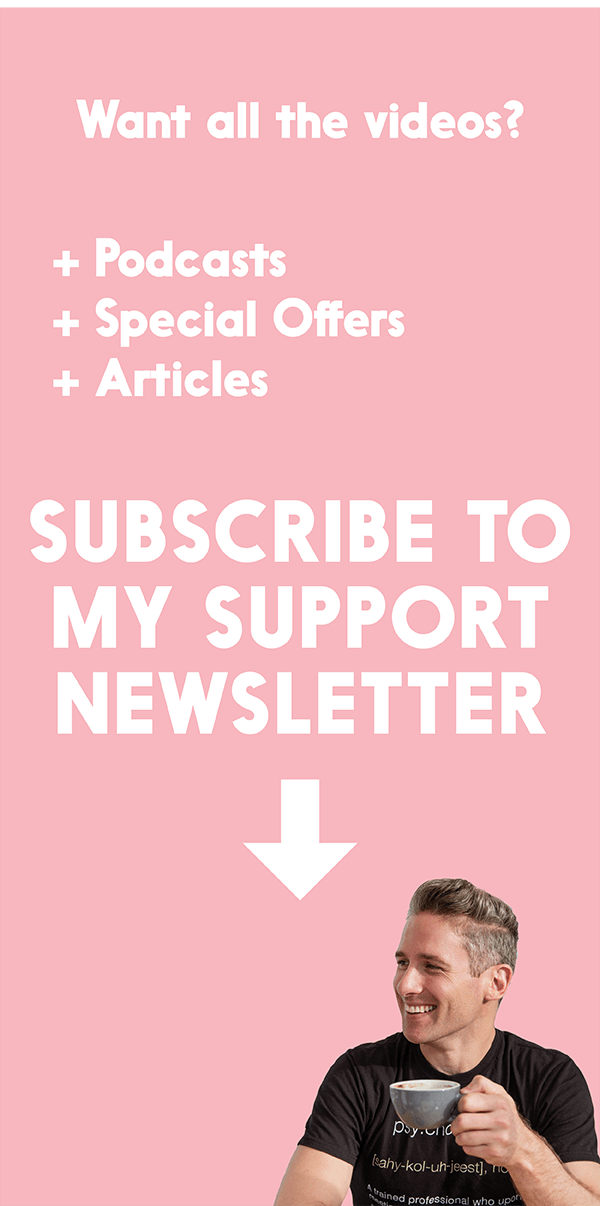
In this Thursday Therapy episode, Glenn Mackintosh explains that while bored eating may be hard to identify, it is easy to overcome. He shares expert advice on how to develop new ways to deal with bored feelings, and provides his three top tips on overcoming procrastination, which often triggers boredom eating!
Watch Video
I created this video for people just like you.
If you found it valuable, please help me share it with them!
LINKS FROM VIDEO
SHOW NOTES
- Question from Dietitian Dr. Gina Cleo on boredom eating. [01:20]
- Boredom eating is a type of emotional eating. [02:23]
- Doing something else that engages your brain. [02:56]
- What to do when you can eat while engaging your brain! [04:27]
- A different use for your willpower. [04:51]
- Practicing mindfulness. [05:20]
- Developing new associations. [05:35]
- What if I don’t want to do what I “should” be doing (overcoming ‘procrastin-eating’). [06:34]
- Overcoming procrastination: breaking it down. [07:16]
- Overcoming procrastination: lowering the bar. [08:03]
- Overcoming procrastination: switching the order. [08.48]
- Some final thoughts on boredom eating (& developing reminders!) [10:28]
TRANSCRIPT
Welcome to Thursday Therapy. I’m Glenn Mackintosh the weight psych and the question were answering today is, “How do I avoid eating out of boredom?” Welcome to Thursday Therapy. Today’s question comes from Gina. Gina is the first person brave enough to ask a video question, so let’s watch it. Hey, Glenn I wanted to throw in a question for this week’s Thursday Therapy. This is a question I get asked all the time, so I’m really looking forward to hearing what you have to say from a psychology point of view. The question is, how do I avoid eating out of boredom? all right hear from you soon, thanks.
Thanks for your question Gina, it’s one that I get asked all the time to. Guys, Gina’s a dietitian and I’m very happy to answer questions from health professionals on Thursday Therapy as long as they’re really relevant to our community. If you’re a health professional also feel free to have your clients ask me a question, in fact what I’ll do is I’ll provide a link to my professional Facebook. I’m always sharing stuff there that I think is cool, commenting on the latest topical event and just letting you know what we’re doing, so please be my friend on Facebook but for now let’s get to answering Gina’s question.
It’s an excellent question because boredom is one of those sneaky little types of emotional eating, they kind of creep under the radar you know, if you’re really stressed you probably know about it, if you’re really upset by something you’ll know about it, if you’re really angry you know about it, but sometimes it’s kind of hard to identify when you’re doing a little bit of bored eating, so I can kind of be tricky to pick up. The good news is though, that when you do identify it it’s actually one of the easiest types of emotional eating to solve, so let me show you how. So, the thing you’re going to want to do to overcome bored eating is you’re going to want to do something else.
You probably think, yes Glenn, I’ve heard that, I’m going to do something else, I know that but the key is you have to do something that really engages your brain so that’s your homework between now and next Thursday Therapy. Find a task or a couple of tasks that really engage your brain that really zen-like experiences for you. For example, you might like to read a book but if it’s a book, it’s going to have to be a great book, one that really you can escape into and one that really absorbs you. I’ve had plenty of clients that have traded that zombie-like evening TV and eating-athon for a really well-chosen movie or a really well-chosen episode of a great series that they love and hey presto, no bored eating.
A lot of people like to do crafty things too, something with your hands is really good as well. I know Gina likes to go home over Saturday night do her knitting and Emma is laughing at me but I know she likes to do brush lettering like a total geek as well, but whatever it is find something that really absorbs you and is a really zen-like experience. Something that really consumes you because when you find that thing you won’t consume the food, they’ll just be no room in your brain for thoughts of food. Of course, developing new habits can be challenging and some of these new behaviours you can actually do while you’re eating and you’re obviously not going to want to do that if you’re going to overcome bored eating. So, let me give you a few of my favourite tips on how to get yourself through.
The first one would be just to use willpower. You don’t want to use willpower to rely on forever but you can use it when you’re developing new habits. Gina is actually doing her research on habits for weight management and what she told us at our last workshop is that it takes about 66 days to make new eating and moving habits. Sorry, it’s not 21, but if you can use your willpower for those 66 days the alternatives will become your new habits. The second thing that I want you to do is practice mindfulness.
Mindfulness is about focusing on what’s happening at the time, it’s about being present in the moment and the more you’re absorbed in that new behaviour the less your thoughts will drift to food. The final thing that I want you to do is think about if you can create some new associations, so while you’re reading or while you’re doing your crafts or watching TV, I want you to think about, is there anything that I can replace this habit with, some people it’s tea for me, it’s sparkling water.
I used to have a routine that was developed from my family it was a lovely routine whenever we’d sit down and watch a movie we’d pass around the lollies and maybe some magnums and maybe some chips, it was really nice and like most people I carried that into my adulthood. Until one of my supervisors talked me through what I’m talking you through and now when I go to watch a movie I feel really weird if I don’t have my sparkling water but thoughts of any other food, they’re just not there for me at all. So, really give yourself a go with these new techniques. Now of course, sometimes when you’re bored, there’s something you could be or maybe you should be doing.
So, bored eating and what we call at weight management psychology, ‘procrastinEAting’ are first cousins. So, what I want to do is, I want to give you my three top tips on how to overcome procrastination. I learned these I think in third year of uni and as my poor work colleagues will tell you, now I am an absolutely terrible procrastinator, I’m a highly effective worker and I don’t do it any bored eating at all. So, I’m sure that some of these tips will really help you as much as they help me. The first thing to do to help you overcome procrastination is take the bigger tasks that you have to do and break it into smaller, really manageable chunks.
Now you’ve probably heard this before but I’d really encourage you to connect with it, at that point where you’re making the decision. When you see the overall task too much you can always feel like you’re behind on the task, even if you do a bit of the task it’s not very motivating because you still see all that stuff that hasn’t been done yet, but when you break it into little tasks and focus almost solely on that specific task, you can tick it off and you always feel like you’re achieving as you tick off all of those little parts that make the whole. The second thing I want you to try is, and this is a weird one, I want you to consider setting the bar lower.
Sometimes when we set the bar really high, it’s like this is too hard for me to jump over, so we just don’t start but if you set the bar low and let yourself jump over it, then you can achieve the task and then raise the bar up higher as you go. A lot of perfectionists are also really good procrastinators, so I want you to reflect on if this is you, that perfect is the enemy of good. Don’t try to do a perfect job, aim to do a good job and get started. The third thing that I want you to think about and this to me is the most important principle, is to reverse the order of what you’re going to do in your mind. For most people, the procrastinating model is really simple, it’s I’ll do this, like watch a bit of TV or read a book or eat some food, and then I’ll do the task.
The problem with that, is you kid yourself that you’re relaxing, you’re not really relaxing when you’re doing the procrastinating because you still know that that thing has to be done. Then you’re telling yourself that you’re going to do the task but rarely does the task get done or done well anyways, so it’s a really flawed model but, and this does take a bit of willpower, if you just reverse the order and say you know, I’m going to do that work task or I’m going to do that load of washing or whatever it is and then I’m going to give myself time to read a book or watch TV. Firstly the task gets done, which is awesome, then secondly the task afterwards, whether it’s watching TV or reading a book, becomes real relaxation you are really enjoying it and also because the task has been done it becomes like a reward and what the rewards do in the psychologist dictionary they strengthen your behaviour, so if every time you’re getting good at doing the task then rewarding yourself, you’re actually making a great choice at that time, you’re overcoming procrastinating but you’re also making yourself more likely to be more productive into the future. So, I hope you enjoyed those tips guys, my final thought for you would be anything that you find helpful, write it down print it out, find a way to be mindful of it when you’re making that decision, that way you’ll turn this information into transformation.
The last thing I want to do is give a big shout out to Bond University. Thank you Tara for getting me my Bond shirt I feel like this is such a cool I feel like an American college kid. Bond is a fantastic Uni, we’ve been having more and more to do with them, they have a wonderful Dietetics department, led by Tara Diversi and has some great teaching staff like Gina, who asked this question and my bias as a psychologist is that I think dietitians can really learn from psychologists and I really appreciate that the psychological mindedness of the program they do there at the Masters of Dietetics.
I did a workshop for them a little while back and I said, oh, you guys should learn a bit about non-dieting and they said, yeah, we’re learning about that and I said you guys should learn about tapping they said, oh yeah, we’re learning about that and they also are including a lot of counselling in the program which is really important for dieticians, so awesome job there and their psychology department is amazing as well. Peter Stapleton, our tapping guru, runs the clinical masters of health psychology, supported by great teachers like Amy Bannatyne who is just one of the smartest brains I know. She’s a total enigma and the whole psychology department is doing things at a very evidence-base but very progressive, very exciting thing, so I feel like the students in that the Masters of the Dietetics and in that the Masters of Psychology are in really wonderful hands and I also appreciate there’s some research of our programs they’ve researched our online tapping program which is in publication but showing great results and we’re potentially looking at a collaboration to research my 12-month transformation program.
I ask the universe in a previous Thursday Therapy for the right university and it looks like we’ve found them. So, I’m really thankful for Bond University for all of our collaboration. I think it’s a wonderful place. Guys, thanks for being with me for another Thursday Therapy. I really hope you play around with the ideas and I’d love to hear how it’s going, of course, how many people do we know that have a challenge of bored eating? So, if someone hasn’t been exposed to my ideas, share this video with them and of course if you haven’t already, subscribe for regular sessions with me and I’ll see you in a couple of weeks.





